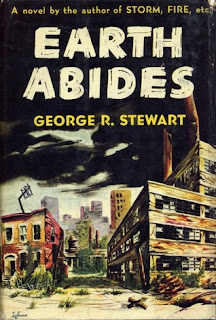 Fever by Deon Meyer
Fever by Deon MeyerMy rating: 4 of 5 stars
I've read and enjoyed several books that envisage a scenario in which the world's human population is drastically reduced following some cataclysmic event. In Fever the cataclysmic event is a pandemic which seems uncanny in the light of the Covid-19 pandemic, which started two years after the book was published, and the book also predicted a Covid variant.
I can't help comparing it with others in the sub-genre that I have read, Earth Abides by George Stewart and The Stand by Stephen King. Earth Abides, which I read in the early 1960s, introduced me to the concept of ecology and the effects that the presence (or absence) of human beings have on the environment.
One effect of such a cataclysm, envisaged by all three of the authors I have mentioned, is a new Dark Age, where humanity is divided into isolated pockets of people struggling to develop a new community. In Fever some of these attempts were constructive, and others destructive. As in the European Dark Ages, there is an incipient feudalism, with marauding predatory gangs of bikers, who might, if they developed along those lines, become warlords and protectors that evolved into the aristocracy of the High Middle Ages. Meyer reminds us that most of the aristocracies of Europe originated in the medieval equivalents of the leaders of biker gangs.
The story is told mainly from the point of view of a teenager, Nico Storm, whose father, Willem, is aware of this danger, and tries to gather people who want to rebuild a productive community, and chooses a site by a dam on the Gariep (Orange) River which has hydro-electricity, plentiful water, and potential for irrigation of crops. They produce leaflets to inform other survivors of their community, and distribute them as widely as they can, as a result of which small and large groups of people join them.
Some of the people who join them have useful skills for maintaining the electrical generating equipment, or producing diesel fuel from plants. One, who chooses to be known only as Domingo, has military skills, to ward off the attacks of biker gangs,
The different characters of the leaders of the community also reflect different trends in society. Willem Storm, the ethical humanist, wants an inclusive society in which people of different backgrounds and interests can live together in peace and freedom, and wants the community to be governed democratically. Domingo, the militarist, thinks a benevolent dictatorship would be better, especially in the chaotic times in which they are living, Pastor Nkosi, representing the religious interest, longs for a utopian community of dedicated Christians living in a theocracy. But somehow they manage for the most part to balance these different visions.
I thought Deon Meyer told the story very well, and found it an enjoyable read. The events all seemed believable in the context of the story, until the last 25 pages or so. Then it jumped the shark, and I found the ending of the story disappointing, and almost an anticlimax. It reminded me of another TV series, Dallas, which did something similar when one of the characters returned from the dead. If it weren't for the weak ending, I would have given it 5 stars on GoodReads.
But I also found The Stand by Stephen King disappointing, and more disappointing than this one, because the disappointment came much earlier in the story -- it was the introduction of a villain who smacked of cheap melodrama, the kind of opponent that Batman would have to deal with, rather than the characters in Stephen King's novel. The villains in Fever are far more convincing, and just as villainous.
In Earth Abides George Stewart has, in some ways a more pessimistic vision, though there is less overt violence than there is in the other two books. But in that book the random survivors have no special skills, and when a community does form, it takes longer, and there is no Willem Storm to provide the vision and lead it. Most attempts to rebuild a community according to a plan fail, because there are simply not enough people with the necessary skills to carry out anything planned, and the community develops in a largely unplanned but possibly more organic way.
Earth Abides was first published in 1947, and is set on the west coast of the USA, and for years after reading it I tried to imagine what I would do in similar circumstances, if such a cataclysm occurred in South Africa. Deon Meyer was obviously wondering the same thing, and his book is the result. My imaginings were similar in some ways, but different in others. I pictured roads deteriorating rapidly, as they tend to do without traffic, and envisaged travelling by rail, using steam engines, which could be made to burn wood if necessary, and so be less dependent on imported fossil fuel.



No comments:
Post a Comment